How Heavy Should My Dog Be
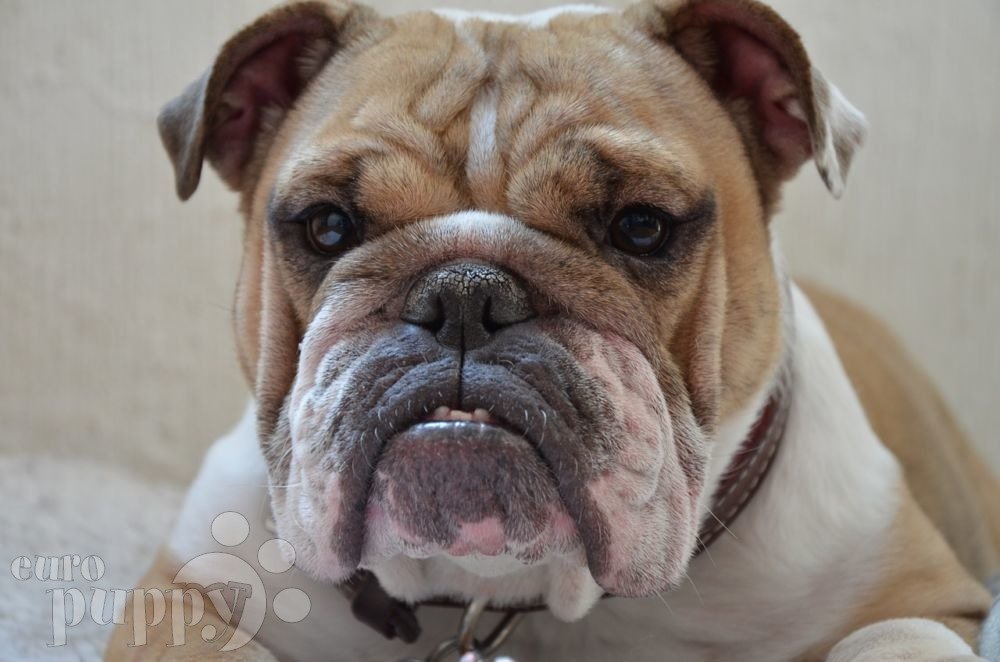
It is not uncommon for pet owners to ask, 'how heavy should my dog be?' The answer varies as a dog's weight is determined by many factors, including breed, age, activity level, and health status.
The weight of your canine companion can be affected by their diet. If you are feeding your pet too many treats or snacks, he may end up heavier than average. It is important to monitor how much food you give him each day in order to keep him at an appropriate weight.
It can sometimes be hard to tell if your dog is at a healthy weight, but you should always trust your instincts. If he seems very heavy and sluggish, then it's possible that he needs to go on a diet. You don't want him to get too heavy because this could lead to health problems such as arthritis, hip dysplasia, and diabetes.
If you notice any unusual changes in weight (either gaining or losing), it could mean there's something wrong with his health. Don't hesitate to contact your veterinarian if this is the case.
Just as with humans, cats, or most other animals, it is recommended that your dog is at a healthy weight to have the best quality of life possible. This article will provide information about the optimal weight for male and female dogs of different breeds. We will also discuss how to tell if your dog is overweight, the dangers of obesity, and how to help him lose weight.
If you want to know 'how much should my dog weigh,' let's get started.
How a Vet Checks If Your Dog Is at a Healthy Weight
There are a few different ways your veterinarian can determine if your pup is at the right weight. One way, known as the body condition score, will grade your dog on their level of fatness or thinness based on a 1-9 rating system. This will establish if your dog is too thin 1-3, at an ideal weight 4-6, and too heavy 7-9. The body condition score uses both touch and visual cues to determine whether he is too thin or fat.
You can carry out a similar check yourself by looking at your dog from above. You should be able to see the hips and ribs without seeing any bones poking out. If you can see his ribs, he may be underweight; if your dog's abdomen pokes out, he is probably overweight. You can also use your sense of touch to feel if your dog is at a healthy weight by touching his rib area and abdomen to judge how it feels.
If you are still unsure if your dog is at an ideal weight, it is always best to consult with your vet, who will use their expertise and knowledge by looking at your dog's gender, age, and body type as well as comparing him to the breed standards of the dog.
Dog Breed Categories by Size
Dogs are typically categorized according to their weight and height. For example, some breeds range from small under 20 pounds, while others can grow up to 100 pounds or more. These categories include small dogs such as the Chihuahua, Japanese Chin, Toy Poodle, and Boston Terrier. Medium dogs such as the Beagle, Border Collie, and bulldog. Large dogs such as the German shepherd and Golden Retriever. And giant breeds such as Great Danes and the Bernese Mountain Dog.
Small Breeds
A small breed dog is defined as a dog that typically weighs less than 20 pounds. Teacup, toy, and miniature breeds are some of the subcategories of this type. This size breed requires food specially formulated to satisfy their high energy requirements.Because they usually spend most of their time indoors, some smaller breeds may be more prone to gain weight. For this reason, you should ensure that you are feeding your dog the appropriate amount of calories to maintain a healthy weight and keep her active with age-appropriate daily exercise.
Small Breed Weight Chart
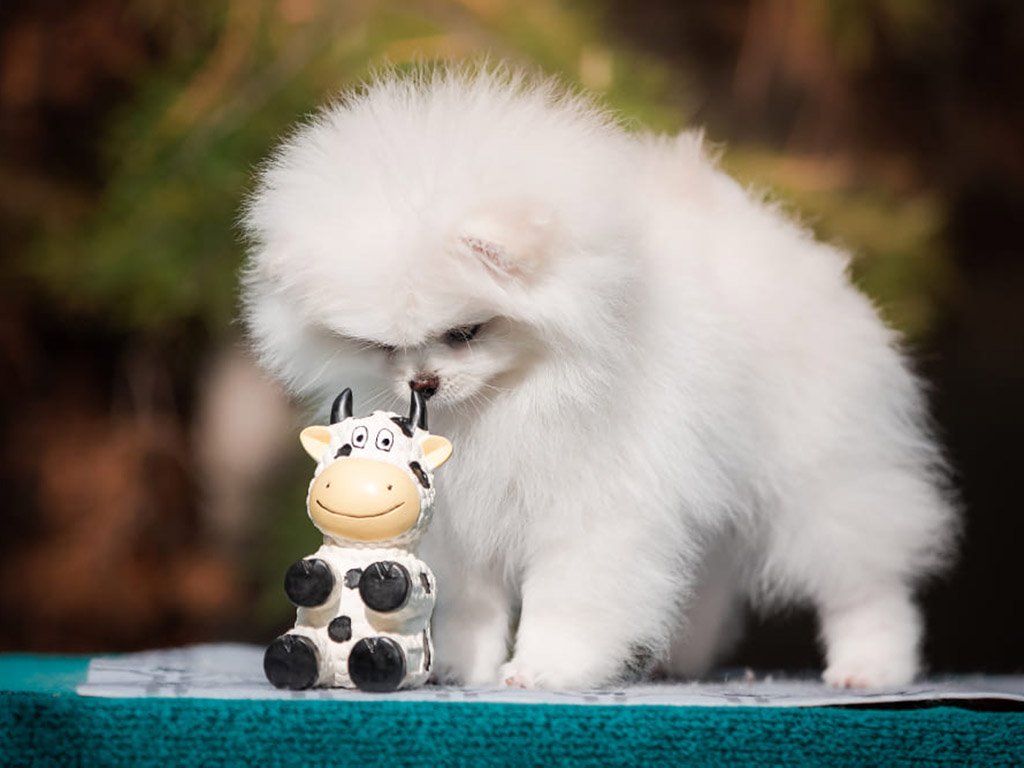
| Dog Breed | Weight Male | Weight Female | Height Male | Height Female |
| Affenpinscher | 7-12 pounds | 6-11 pounds | 9-12 inches | 8-12 inches |
| Bichon Frise | 7-12 pounds | 5-10 pounds | 9-12 inches | 9-11 inches |
| Biewer Yorkie | 5-7 pounds | 4-6 pounds | 6-9 inches | 4-7 inches |
| Bolognese | 5-9 pounds | 4-8 pounds | 5-12 inches | 10-11 inches |
| Border Terrier | 13-16 pounds | 11-14 pounds | 13-16 inches | 11-14 inches |
| Boston Terrier | 10-25 pounds | 10-25 pounds | 15-17 inches | 15-17 inches |
| Brussels Griffon | 6-12 pounds | 6-12 pounds | 7-8 inches | 7-8 inches |
| Cavalier King Charles Spaniel | 13-18 pounds | 10-16 pounds | 12-13 inches | 10-12 inches |
| Cavapom | 8-20 pounds | 8-20 pounds | 12-15 inches | 12-15 inches |
| Cavapoo | 9-25 pounds | 9-25 pounds | 9-14 inches | 9-14 inches |
| Chihuahua | 2-6 pounds | 2-5 pounds | 6-12 inches | 5-10 inches |
| Chinese Crested | 8-12 pounds | 5-10 pounds | 11-13 inches | 9-12 inches |
| Coton de Tulear | 12-15 pounds | 10-13 pounds | 10-12 inches | 8-10 inches |
| Dachshund | 11 pounds | 11 pounds | 14-16 inches | 13-15 inches |
| Fox Terrier | 15-20 pounds | 13-18 pounds | 14-16 inches | 13-15 inches |
| French Bulldog | under 28 pounds | under 28 pounds | 11-13 inches | 11-13 inches |
| German Pinscher | 25-35 pounds | 23-35 pounds | 17-20 inches | 16-18 inches |
| Havanese | 8-13 pounds | 6-11 pounds | 8-11 inches | 8-11 inches |
| Jack Russell Terrier | 13-18 pounds | 11-15 pounds | 10-14 inches | 8-12 inches |
| Japanese Chin | 4-9 pounds | 4-9 pounds | 7-11 inches | 6-10 inches |
| King Charles Spaniel | 10-14 pounds | 8-12 pounds | 10-11 inches | 8-9 inches |
| Lhasa Apso | 14-18 pounds | 12-16 pounds | 10-11 inches | 10-11 inches |
| Maltese | 6-9 pounds | 5-8 pounds | 8-10 inches | 8-9 inches |
| Maltipom | 3-9 pounds | 3-9 pounds | 8-12 inches | 8-12 inches |
| Maltipoo | 5-20 pounds | 5-20 pounds | 8-15 inches | 8-15 inches |
| Miniature Pinscher | 8-10 pounds | 8-9 pounds | 10-12 inches | 10-11 inches |
| Miniature Poodle | 15-17 pounds | 13-15 pounds | 11-15 inches | 10-13 inches |
| Miniature Schnauzer | 11-18 pounds | 10-15 pounds | 12-14 inches | 11-13 inches |
| Norfolk Terrier | 10-12 pounds | 8-11 pounds | 10-12 inches | 9-11 inches |
| Norwich Terrier | 10-12 pounds | 9-11 pounds | 10-12 inches | 9-11 inches |
| Papillon | 8-10 pounds | 7-9 pounds | 8-11 inches | 7-10 inches |
| Pekingese | 8-10 pounds | 6-8 pounds | 6-9 inches | 5-7 inches |
| Pomeranian | 3-7 pounds | 3-5 pounds | 7-8.66 inches | 7-8.66 inches |
| Pug | 13-20 pounds | 13-18 pounds | 12-14 inches | 10-12 inches |
| Scottish Terrier | 19-23 pounds | 17-21 pounds | 10-11 inches | 8-10 inches |
| Sealyham | 18-20 pounds | 16-19 pounds | 10-12 inches | 8-10 inches |
| Shih Tzu | 10-16 pounds | 9-14 pounds | 8-11 inches | 8-11 inches |
| Skye Terrier | 20-30 pounds | 18-27 pounds | 9-10 inches | 7-9 inches |
| Toy Poodle | 6-9 pounds | 5-8 pounds | 10-15 inches | 9-14 inches |
| Welsh Corgi | 24-31 pounds | 24-31 pounds | 10-12 inches | 10-12 inches |
| West Highland White Terrier | 13-22 pounds | 11-20 pounds | 9-12 inches | 8-11 inches |
| Yorkshire Terrier | 4-7 pounds | 3-6 pounds | 6-9 inches | 5-7 inches |
Medium Breeds
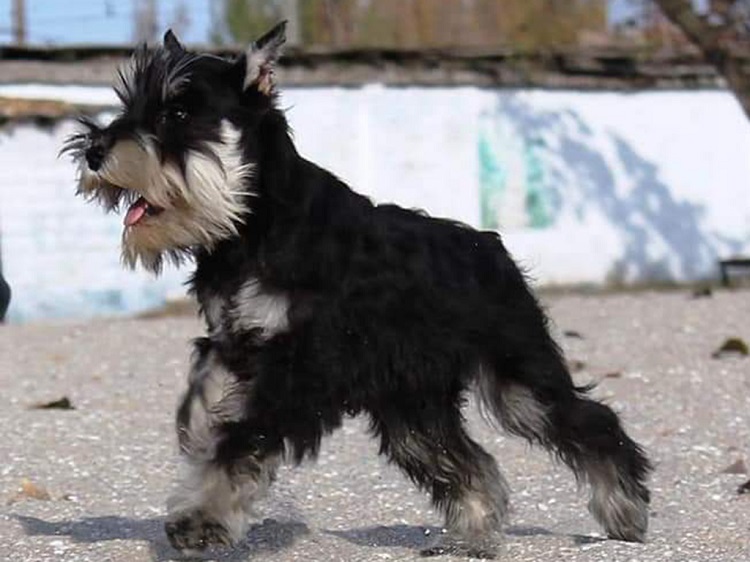
Medium dog breeds are the most prolific and range in size from 20 pounds to 60 pounds. Many dogs of this size were bred as working dogs and have high levels of energy. However, in today's society, most now live less active lifestyles in comparison. To stay at an ideal weight, they need to engage in regular activity daily and consume an optimal diet.
Medium Breed Weight Chart
| Dog Breed | Weight Male | Weight Female | Height Male | Height Female |
| American Bully | 50-130 pounds | 45-120 pounds | 17-20 inches | 16-19 inches |
| American Cocker Spaniel | 25-30 pounds | 15-25 pounds | 15 inches | 14 inches |
| American Staffordshire Terrier | 57-67 pounds | 45-55 pounds | 17-19 inches | 16-18 inches |
| Basenji | 22-26 pounds | 20-25 pounds | 16-17 inches | 15-16 inches |
| Beagle | 22-25 pounds | 20-23 pounds | 14-16 inches | 13-15 inches |
| Bull Terrier | 55-80 pounds | 45-65 pounds | 20-24 inches | 20-24 inches |
| Bulldog | 50-55 pounds | 48-52 pounds | 12-16 inches | 10-14 inches |
| Cairn Terrier | 14-18 pounds | 13-17 pounds | 10-13 inches | 9-12 inches |
| Catahoula Leopard Dog | 60-110 pounds | 50-100 pounds | 22-26 inches | 20-24 inches |
| Chinese Shar-Pei | 40-60 pounds | 35-55 pounds | 18-20 inches | 16-18 inches |
| Dandie Dinmont Terrier | 20-24 pounds | 18-22 pounds | 8-11 inches | 8-11 inches |
| English Bulldog | 50-55 pounds | 48-52 pounds | 12-16 inches | 10-14 inches |
| English Cocker Spaniel | 28-34 pounds | 26-32 pounds | 15-17 inches | 14-16 inches |
| English Toy Spaniel | 10-14 pounds | 8-12 pounds | 10-11 inches | 8-9 inches |
| Jagd Terrier | 20-22 pounds | 18-20 pounds | 13-16 inches | 11-14 inches |
| Kerry Blue Terrier | 35-40 pounds | 33-38 pounds | 18-20 inches | 17-19 inches |
| Lakeland Terrier | 14-18 pounds | 13-16 pounds | 13-15 inches | 11-13 inches |
| Miniature Bull Terrier | 24-33 pounds | 22-30 pounds | 10-14 inches | 8-12 inches |
| Miniature English Bulldog | 14-18 pounds | 11-16 pounds | 10-14 inches | 8-12 inches |
| Mudi | 20-30 pounds | 18-27 pounds | 14-20 inches | 12-18 inches |
| Pomsky | 9-15 pounds | 9-15 pounds | 35-45 inches | 35-45 inches |
| Portuguese Water Dog | 35-50 pounds | 30-49 pounds | 20-22 inches | 17-20 inches |
| Puli | 25-35 pounds | 20-30 pounds | 16-17 inches | 14-16 inches |
| Pumi | 18-33 pounds | 16-30 pounds | 13-19 inches | 12-17 inches |
| Samoyed | 45-65 pounds | 35-50 pounds | 21-23 inches | 19-21 inches |
| Shar-Pei | 40-60 pounds | 35-55 pounds | 20-20 inches | 16-18 inches |
| Shetland Sheepdog | 14-18 pounds | 12-16 pounds | 13-15 inches | 12-14 inches |
| Shiba Inu | 20-30 pounds | 18-28 pounds | 14-16 inches | 13-15 inches |
| Soft Coated Wheaten Terrier | 35-45 pounds | 30-40 pounds | 18-20 inches | 17-19 inches |
| Staffordshire Bull Terrier | 25-38 pounds | 23-35 pounds | 17-19 inches | 16-18 inches |
| Standard Poodle | 45-70 pounds | 45-60 pounds | 15-26 inches | 15-25 inches |
| Tibetan Spaniel | 11-15 pounds | 9-13 pounds | 9-10 inches | 9-10 inches |
| Tibetan Terrier | 18-30 pounds | 16-28 pounds | 14-17 inches | 13-15 inches |
| Uruguayan Cimarron | 84-99 pounds | 72-88 pounds | 23-24 inches | 21-23 inches |
| Welsh Terrier | 20-21 pounds | 19-20 pounds | 14-16 inches | 14-16 inches |
Large Breeds
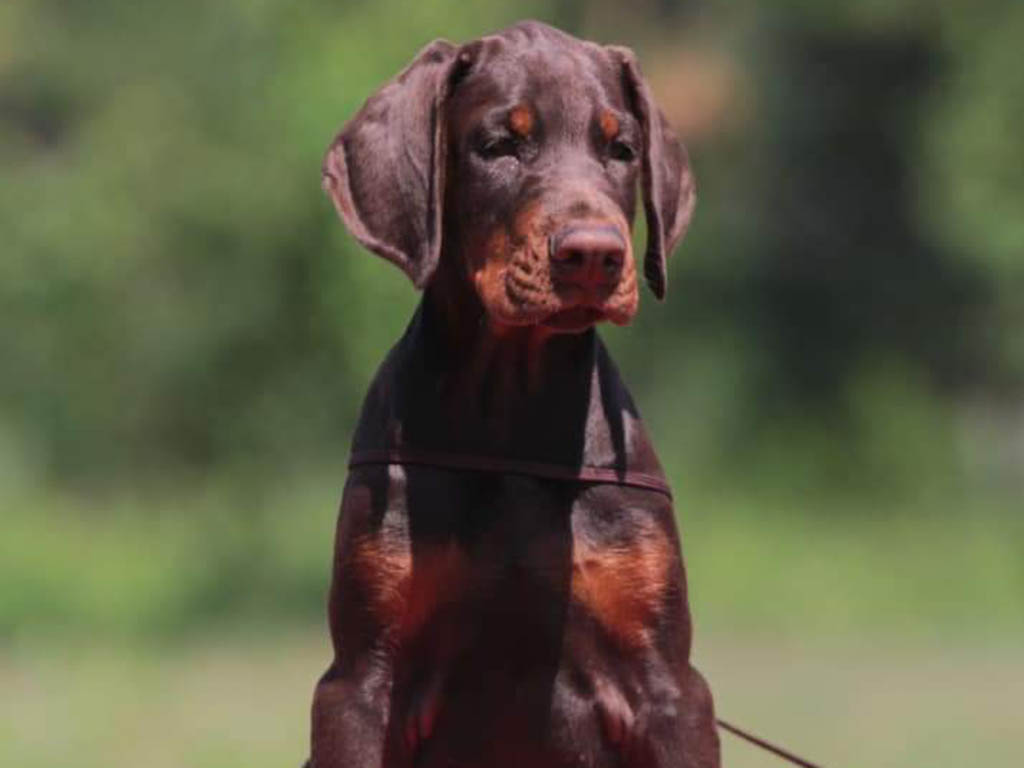
Large dogs are a category that encompasses most dogs weighing 50 pounds and 100 pounds. Large dogs can be the perfect choice for people who have a lot of space to accommodate them. A health issue that can affect large dogs as they get older is obesity. As they get older, their mobility becomes restricted due to joint problems, which in turn leads them to walk less and eat more food because they aren't moving as much.
If you believe your dog is overweight, it is important to take action before his large size becomes more of a problem. It's best for your dog’s health and longevity if he stays healthy with an appropriate weight throughout adulthood.
Large Breed Weight Chart
| Dog Breed | Weight Male | Weight Female | Height Male | Height Female |
| Afghan Hound | 50-60 pounds | 40-50 pounds | 25-27 inches | 23-25 inches |
| Airedale Terrier | 50-65 pounds | 40-45 pounds | 22-24 inches | 22-23 inches |
| Akita Inu | 75-120 pounds | 75-110 pounds | 26-28 inches | 24-26 inches |
| Alaskan Malamute | 80-95 pounds | 70-85 pounds | 24-26 inches | 22-24 inches |
| American Akita | 75-120 pounds | 75-110 pounds | 26-28 inches | 24-26 inches |
| American Bulldog | 70-120 pounds | 60-110 pounds | 22-28 inches | 20-26 inches |
| Appenzeller | 49-70 pounds | 49-70 pounds | 22-23 inches | 18-20 inches |
| Argentine Dogo | 80-100 pounds | 70-80 pounds | 24-27 inches | 22-25 inches |
| Australian Shepherd | 50-65 pounds | 40-55 pounds | 20-23 inches | 18-21 inches |
| Basset Hound | 50-65 pounds | 45-60 pounds | 12-15 inches | 11-14 inches |
| Bearded Collie | 45-60 pounds | 40-55 pounds | 21-22 inches | 20-21 inches |
| Belgian Malinois | 55-65 pounds | 40-60 pounds | 24-26 inches | 22-24 inches |
| Belgian Sheepdog | 60-80 pounds | 40-70 pounds | 24-26 inches | 22-24 inches |
| Belgian Tervuren | 65-75 pounds | 60-70 pounds | 24-26 inches | 22-24 inches |
| Bloodhound | 90-110 pounds | 80-100 pounds | 25-27 inches | 23-25 inches |
| Bobtail | 65-85 pounds | 60-75 pounds | 22-24 inches | 20-22 inches |
| Border Collie | 30-45 pounds | 27-42 pounds | 19-22 inches | 18-21 inches |
| Bouvier | 75-90 pounds | 60-80 pounds | 23-28 inches | 22-27 inches |
| Boxer | 60-70 pounds | 53-65 pounds | 22-25 inches | 21-24 inches |
| Briard | 60-90.9 pounds | 50-75 pounds | 23-27 inches | 22-26 inches |
| Cane Corso | 99-110 pounds | 88-89 pounds | 24-27 inches | 23-25 inches |
| Chow Chow | 50-70 pounds | 45-65 pounds | 19-22 inches | 18-20 inches |
| Clumber Spaniel | 60-85 pounds | 55-70 pounds | 19-20 inches | 17-19 inches |
| Collie | 60-75 pounds | 50-65 pounds | 24-26 inches | 22-24 inches |
| Dalmatian | 50-70 pounds | 45-55 pounds | 22-24 inches | 20-22 inches |
| Doberman Pinscher | 66-90 pounds | 65-80 pounds | 26-28 inches | 24-26 inches |
| Dogo Argentino | 80-100 pounds | 70-80 pounds | 24-27 inches | 22-25 inches |
| Dogue de Bordeaux | 110-145 pounds | 99-120 pounds | 23-30 inches | 22-27 inches |
| English Setter | 55-80 pounds | 45-70 pounds | 24-27 inches | 23-27 inches |
| Entlebucher | 55-66 pounds | 45-55 pounds | 19-20 inches | 16-18 inches |
| French Mastiff | 110-145 pounds | 99-120 pounds | 23-30 inches | 22-27 inches |
| German Pointer | 60-70 pounds | 45-65 pounds | 24-26 inches | 22-24 inches |
| German Shepherd Dog | 77-95 pounds | 75-85 pounds | 24-26 inches | 22-24 inches |
| Golden Retriever | 60-80 pounds | 55-70 pounds | 22-24 inches | 20-22 inches |
| Groenandael Belgian Shepherd | 55-80 pounds | 50-65 pounds | 24-26 inches | 22-24 inches |
| Hungarian Greyhound | 53-68 pounds | 49-64 pounds | 25.5-27.5 inches | 24-26 inches |
| Hungarian Vizsla | 45-60 pounds | 40-55 pounds | 22-26 inches | 20-24 inches |
| Irish Setter | 65-75 pounds | 55-65 pounds | 26-28 inches | 24-26 inches |
| Irish Terrier | 25-27 pounds | 22-26 pounds | 18-19 inches | 16-18 inches |
| Italian Greyhound | 6-10 pounds | 4-8 pounds | 12-15 inches | 10-13 inches |
| Italian Mastiff | 99-110 pounds | 88-89 pounds | 24-27 inches | 23-25 inches |
| Kai Ken | 35-40 pounds | 30-35 pounds | 18-20 inches | 18-20 inches |
| Korean Jindo Dog | 18-23 pounds | 15-19 pounds | 50-55 inches | 45-50 inches |
| Kuvasz | 100-115 pounds | 70-90 pounds | 28-30 inches | 26-28 inches |
| Labradoodle | 37-143 pounds | 33-132 pounds | 14-24 inches | 14-23 inches |
| Labrador Retriever | 60-75 pounds | 55-70 pounds | 22-24 inches | 21-23 inches |
| Old English Sheepdog | 65-85 pounds | 60-75 pounds | 22-24 inches | 20-22 inches |
| Pointer | 44-66 pounds | 42-60 pounds | 22-24 inches | 21-24 inches |
| Polski Owczarek Nizinny | 30-35 pounds | 28-33 pounds | 16-20 inches | 14-18 inches |
| Rhodesian Ridgeback | 80-90 pounds | 65-75 pounds | 25-27 inches | 24-26 inches |
| Rottweiler | 95-130 pounds | 85-115 pounds | 24-27 inches | 22-25 inches |
| Saluki | 29-66 pounds | 27-60 pounds | 26-30 inches | 20-25 inches |
| Siberian Husky | 45-60 pounds | 35-50 pounds | 21-23 inches | 20-22 inches |
| Sussex Spaniel | 40-44 pounds | 35-42 pounds | 15-16 inches | 13-15 inches |
| Transylvanian Hound | 66-77 pounds | 60-70 pounds | 22-26 inches | 18-22 inches |
| Vizsla | 45-60 pounds | 40-55 pounds | 22-26 inches | 20-24 inches |
| Weimaraner | 55-70 pounds | 50-65 pounds | 24-27 inches | 22-25 inches |
| White Swiss Shepherds Dog | 77-85 pounds | 65-78 pounds | 24-26 inches | 22-24 inches |
Giant Breeds
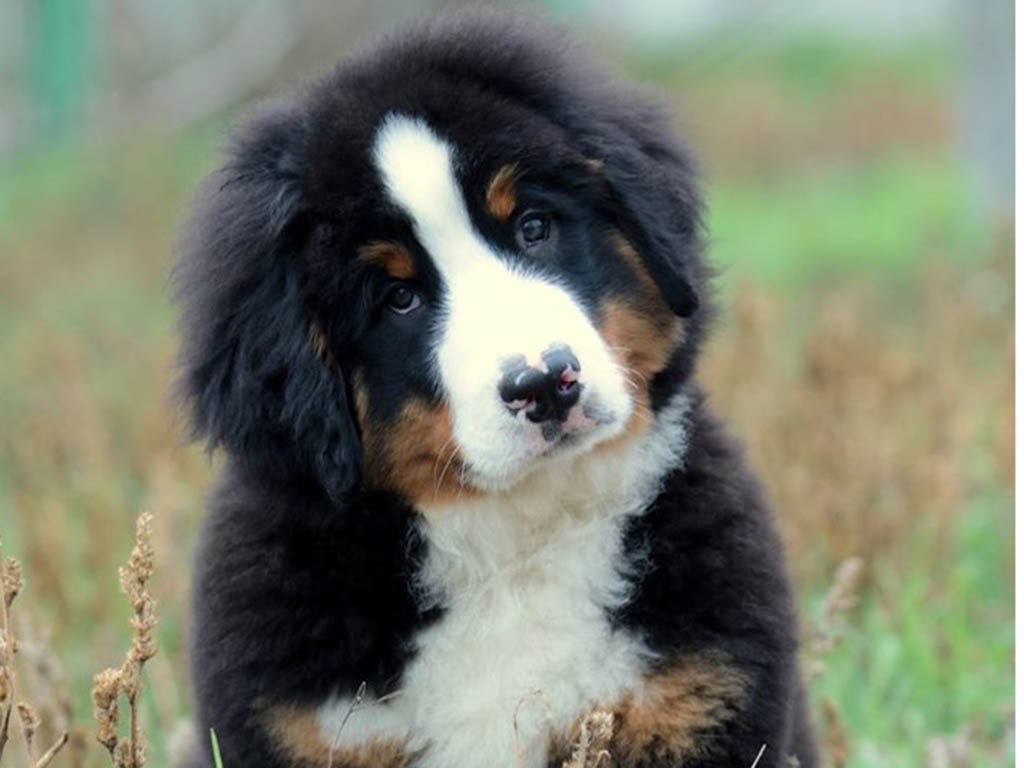
Giant dog breeds include those with an adult weight of around 100 pounds and over when fully grown, such as Irish Wolfhounds, Mastiffs, and Great Danes. These are the largest dog breeds in the world when they are fully grown. Many of them, though fearsome in looks, are gentle giants in actuality. Due to their impressive size, these dogs need to be walked and exercised more often and, as you'd expect, be fed much larger portions of food to match their stature.
However, as with other dog breeds, size, lack of exercise, and too many treats or poor nutrition choices can result in a giant obese dog.
According to the Guinness Book of World Records, an English Mastiff named Zorba was the heaviest dog on record, weighing an enormous 343 pounds.
Giant Breed Weight Chart
| Dog Breed | Weight Male | Weight Female | Height Male | Height Female |
| Bernese Mountain Dog | 85-110 pounds | 80-105 pounds | 24-28 inches | 23-27 inches |
| Black Russian Terrier | 110-133 pounds | 99-110 pounds | 28-30 inches | 26.7-29 inches |
| Boerboel | 154-200 pounds | 150-200 pounds | 25-28 inches | 23-25 inches |
| Borzoi | 75-105 pounds | 60-90 pounds | 28-33 inches | 26-30 inches |
| Bucovina Shepherd | 121-154 pounds | 99-132 pounds | 27-31 inches | 25-28 inches |
| Bullmastiff | 110-133 pounds | 100-120 pounds | 25-27 inches | 24-26 inches |
| Canary Dog | 95-110 pounds | 80-90 pounds | 21-25 inches | 20-23 inches |
| Caucasian Mountain Dog | 99-154 pounds | 80-130 pounds | 25-30 inches | 24-28 inches |
| Central Asian Ovtcharka | 121-176 pounds | 88-143 pounds | 27-32 inches | 24-27 inches |
| English Mastiff | 150-250 pounds | 120-200 pounds | 30-34 inches | 27-32 inches |
| Fila Brasileiro | 90-110 pounds | 80-90 pounds | 25-29 inches | 24-27 inches |
| Giant Schnauzer | 60-80 pounds | 55-75 pounds | 26-28 inches | 23-26 inches |
| Great Dane | 120-200 pounds | 100-130 pounds | 30-34 inches | 28-32 inches |
| Great Pyrenees | 100-125 pounds | 85-115 pounds | 27-32 inches | 25-29 inches |
| Great Swiss Mountain Dog | 130-135 pounds | 85-110 pounds | 23-28 inches | 23-27 inches |
| Hovawart | 55-90 pounds | 55-77 pounds | 23-28 inches | 22-28 inches |
| Irish Wolfhound | 90-150 pounds | 80-130 pounds | 28-35 inches | 26-33 inches |
| Komondor | 110-135 pounds | 88-110 pounds | 27 inches | 19-22 inches |
| Landseer | 132-150 pounds | 100-120 pounds | 21-28 inches | 26-28 inches |
| Leonberger | 130-170 pounds | 100-130 pounds | 29-31 inches | 27-29 inches |
| Mastiff | 150-250 pounds | 120-200 pounds | 30-34 inches | 27-32 inches |
| Moscow Watchdog | 130-150 pounds | 100-130 pounds | 25-27 inches | 23-25 inches |
| Neapolitan Mastiff | 130-180 pounds | 120-160 pounds | 26-30 inches | 24-28 inches |
| Newfoundland | 130-150 pounds | 100-120 pounds | 27-29 inches | 25-27 inches |
| Presa Canario | 95-110 pounds | 80-90 pounds | 21-25 inches | 21-25 inches |
| Romanian Mioritic Shepherd | 120-150 pounds | 100-130 pounds | 27-29 inches | 25-28 inches |
| Saint Bernard | 110-200 pounds | 100-160 pounds | 25-27 inches | 23-25 inches |
| Scottish Deerhound | 80-110 pounds | 75-90 pounds | 26-28 inches | 30 inches |
| South Russian Sheepdog | 110-140 pounds | 100-130 pounds | 25-28 inches | 24-27 inches |
| Standard Schnauzer | 30-45 pounds | 30-40 pounds | 18-20 inches | 17-19 inches |
| Tibetan Mastiff | 140-170 pounds | 130-160 pounds | 25-28 inches | 23-26 inches |
| Tosa Inu | 120-170 pounds | 90-140 pounds | 23-25 inches | 21-24 inches |
Mixed Breeds
Mixed breed dogs are a combination of two or more breeds, which makes it difficult to determine their weight; it can be difficult to answer without knowing all their genetic information.
One way to determine a mixed breed's weight is by using a formula that considers both parent's weights and body type. If one parent is a Labrador Retriever and another is a German Shepherd, then we can roughly estimate weight as anywhere between 55 and 95 pounds. Of course, this will only work if your dog is only of two mixed breeds. It will also be more likely that the mixed breed would be on the higher end of the scale if the father were the German Shepherd and the mother a Lab and vice versa.
Really the best way to know if mixed breeds are under or overweight would be to use the body condition score we discussed earlier in the article and check its abdomen, hip, and rib area to determine the weight.
Puppy Growth
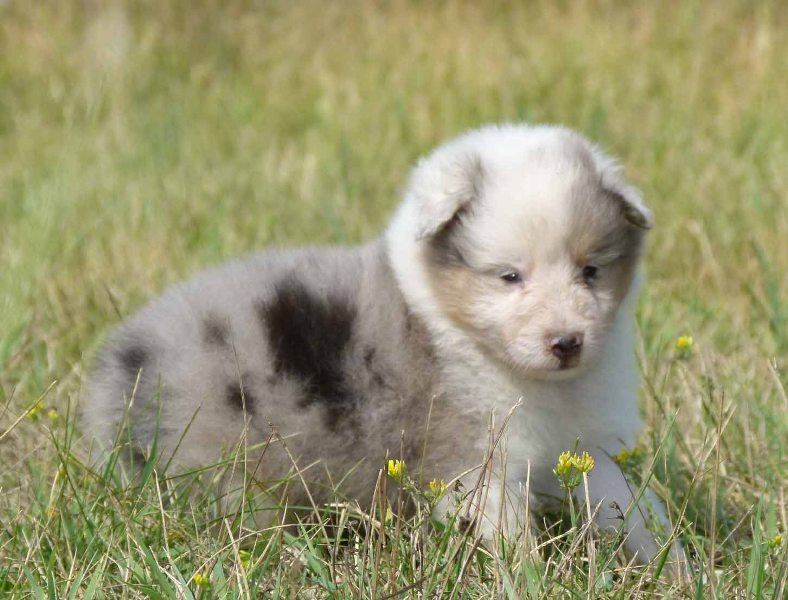
Puppies grow at different rates, and many factors contribute to a puppy's growth rate, such as the size of the litter and breed. All puppies will grow the most from birth to eight weeks old.
Small breed dogs and medium-sized dogs develop and mature more quickly than larger breeds of dogs, typically becoming fully grown within 12 months. On the other hand, large and giant breeds will usually reach full size and maturity at the age of 18 months. You'll also find that your pet will reach the full height before it reaches its full adult weight, so don't worry if it looks a little scrawny. It will soon catch up!
However, do be aware that each puppy is one of a kind, so they might grow at a faster or slower rate. Our puppy growth chart provides an average of what you should expect, but it is not set in stone.
Puppy Weight Chart
If you want to determine how fast your pup is growing, use this handy chart.
| Puppies Age | Weight in Pounds | ||||||
| Small Breeds | |||||||
| 2 months | 1.5lbs | 2.0lbs | 2.5lbs | 3.0lbs | 3.5lbs | 4.0lbs | |
| 3 months | 2.3lbs | 3.0lbs | 3.8lbs | 4.5lbs | 5.3lbs | 6.0lbs | |
| 4 months | 3.0lbs | 4.0lbs | 5.0lbs | 6.0lbs | 7.0lbs | 8.0lbs | |
| 5 months | 4.1lbs | 5.5lbs | 6.9lbs | 8.3lbs | 9.6lbs | 11.0lbs | |
| 6 months | 4.9lbs | 6.5lbs | 8.1lbs | 9.8lbs | 11.4lbs | 13.0lbs | |
| 7 months | 5.6lbs | 7.5lbs | 9.4lbs | 11.3lbs | 13.1lbs | 15.0lbs | |
| 8 months | 6.6lbs | 8.8lbs | 10.9lbs | 13.1lbs | 15.3lbs | 17.5lbs | |
| 9 months | 7.3lbs | 9.8lbs | 12.2lbs | 14.6lbs | 17.1lbs | 19.5lbs | |
| 10 months | 8.1lbs | 19.8lbs | 13.4lbs | 16.1lbs | 18.8lbs | 21.5lbs | |
| 11 months | 9.0lbs | 12.0lbs | 15.0lbs | 18.0lbs | 21.0lbs | 24.0lbs | |
| 12 months | 9.8lbs | 13.0lbs | 16.3lbs | 19.5lbs | 22.8lbs | 26.0lbs | |
| Medium Breeds | |||||||
| 2 months | 4.0lbs | 4.5lbs | 5.0lbs | 5.5lbs | 6.0lbs | 7.0lbs | 8.0lbs |
| 3 months | 6.0lbs | 6.8lbs | 7.5lbs | 8.3lbs | 9.0lbs | 10.5lbs | 12.0lbs |
| 4 months | 8.0lbs | 9.0lbs | 10.0lbs | 11.0lbs | 12.0lbs | 14.0lbs | 16.0lbs |
| 5 months | 11.0lbs | 12.4lbs | 13.8lbs | 15.1lbs | 16.5lbs | 19.3lbs | 22.0lbs |
| 6 months | 13.0lbs | 14.6lbs | 16.3lbs | 17.9lbs | 19.5lbs | 22.8lbs | 26.0lbs |
| 7 months | 15.0lbs | 16.9lbs | 18.8lbs | 20.6lbs | 22.5lbs | 26.3lbs | 30.0lbs |
| 8 months | 17.5lbs | 19.7lbs | 21.9lbs | 24.1lbs | 26.3lbs | 30.6lbs | 35.0lbs |
| 9 months | 19.5lbs | 21.9lbs | 24.4lbs | 26.8lbs | 29.3lbs | 34.1lbs | 39.0lbs |
| 10 months | 21.5lbs | 24.2lbs | 26.9lbs | 29.6lbs | 32.3lbs | 37.6lbs | 43.0lbs |
| 11 months | 24.0lbs | 27.0lbs | 30.0lbs | 33.0lbs | 36.0lbs | 42.0lbs | 48.0lbs |
| 12 months | 26.0lbs | 29.3lbs | 32.5lbs | 35.8lbs | 39.0lbs | 45.5lbs | 52.0lbs |
| Large Breeds | |||||||
| 2 months | 9.0lbs | 10.0lbs | 11.0lbs | 12.0lbs | 13.0lbs | 14.0lbs | 15.0lbs |
| 3 months | 13.5lbs | 15.0lbs | 16.5lbs | 18.0lbs | 19.5lbs | 21.0lbs | 22.5lbs |
| 4 months | 18.0lbs | 20.0lbs | 22.0lbs | 24.0lbs | 26.0lbs | 28.0lbs | 30.0lbs |
| 5 months | 24.8lbs | 27.5lbs | 30.3lbs | 33.0lbs | 35.8lbs | 38.5lbs | 41.3lbs |
| 6 months | 29.3lbs | 32.5lbs | 35.8lbs | 39.0lbs | 42.3lbs | 45.5lbs | 48.8lbs |
| 7 months | 33.8lbs | 37.5lbs | 41.3lbs | 45.0lbs | 48.8lbs | 52.5lbs | 56.3lbs |
| 8 months | 39.4lbs | 43.8lbs | 48.1lbs | 52.5lbs | 56.9lbs | 61.3lbs | 65.5lbs |
| 9 months | 43.9lbs | 48.8lbs | 53.6lbs | 58.5lbs | 63.4lbs | 68.3lbs | 73.1lbs |
| 10 months | 48.4lbs | 53.8lbs | 59.1lbs | 64.5lbs | 69.9lbs | 75.3lbs | 80.6lbs |
| 11 months | 54.0lbs | 60.0lbs | 66.0lbs | 72.0lbs | 78.0lbs | 84.0lbs | 90.0lbs |
| 12 months | 58.5lbs | 65.0lbs | 71.5lbs | 78.0lbs | 84.5lbs | 91.0lbs | 97.5lbs |
| 18 months | 87.8lbs | 97.5lbs | 107.3lbs | 117.0lbs | 126.8lbs | 136.5lbs | 146.3lbs |
| Giant Breeds | |||||||
| 2 months | 16.0lbs | 17.0lbs | 18.0lbs | 19.0lbs | 20.0lbs | 21.0lbs | |
| 3 months | 24.0lbs | 25.5lbs | 27.0lbs | 28.5lbs | 30.0lbs | 31.5lbs | |
| 4 months | 32.0lbs | 34.0lbs | 36.0lbs | 38.0lbs | 40.0lbs | 42.0lbs | |
| 5 months | 34.0lbs | 36.1lbs | 38.3lbs | 40.4lbs | 42.5lbs | 44.6lbs | |
| 6 months | 52.0lbs | 55.3lbs | 58.5lbs | 61.8lbs | 65.0lbs | 68.3lbs | |
| 7 months | 60.0lbs | 63.8lbs | 67.5lbs | 71.3lbs | 75.0lbs | 78.8lbs | |
| 8 months | 70.0lbs | 74.4lbs | 78.8lbs | 83.1lbs | 87.5lbs | 91.9lbs | |
| 9 months | 78.0lbs | 82.9lbs | 87.8lbs | 92.6lbs | 96.5lbs | 102.4lbs | |
| 10 months | 86.0lbs | 91.4lbs | 96.8lbs | 102.1lbs | 107.5lbs | 112.9lbs | |
| 11 months | 96.0lbs | 102.0lbs | 108.0lbs | 114.0lbs | 120.0lbs | 126.0lbs | |
| 12 months | 104.0lbs | 110.5lbs | 117.0lbs | 123.5lbs | 130.0lbs | 136.5lbs | |
| 18 months | 156.0lbs | 165.8lbs | 175.5lbs | 185.3lbs | 195.0lbs | 204.8lbs | |
In Conclusion
After reading this article, you should better understand how to determine if your dog is in the correct weight range. You can use the provided charts to reference what weight class your pet falls into based on their breed and size.
Take into account that the weight of dogs changes depending on the time of year (i.e., winter and summer), so consider checking again in 4 to 6 months when it's more likely an accurate representation of where your pet stands at any given moment.
